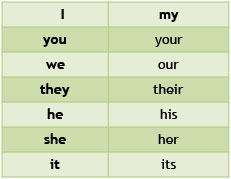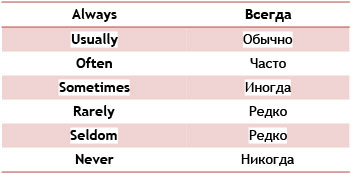Actions (Present Simple)

Use
-
For states (with to be)
I’m happy. We’re hungry. They are ready. - For repeated actions (especially with the adverbs of frequency:
- always
- usually;
- often;
- sometimes;
- rarely=seldom;
- never.
I always drive to work. I usually go to the gym on Mondays and Fridays. He never plays computer games.
3. For laws of nature and permanent truths
4. Programmes and timetables (public transportation, cinemas, theatres, exhibitions) – Future meaning
5. Story-telling, reviews, sports comments.
For actions!!! (Do not use with to be)
Structure:
In statements “+”:
- Noun/pronoun (I, we, a girl, people)
- Verb (+s/es for he/she/it)
He works hard.
We eat tasty meals.
In questions “?”:
- Do/does (for he/she/it)
- Noun, pronoun
- The main verb (no s for he/she/it)
Does he work hard?
Do we eat tasty meals?
In negations “-“:
- Noun/pronoun
- Do/does (for he/she/it)
- “not”
- The main verb (no "s"-ending for he/she/it)
He doesn’t work hard.
We don’t eat tasty meals.
Spelling:
- For most verbs the ending “s” is used: reads, sings, makes, writes…
- After such endings as “ss”, “sh”, “ch”, “x” and “o” add the “es” ending: he confesses, she crashes, he reaches, she mixes, he goes.
- If a verb ends in a “y” with a preceding consonant, change “y” into “i” and add “es”: cry – he cries, try – she tries, accompany – he accompanies.
- If a verb ends in a “y” with a preceding vowel, don’t change the “y”, just add the “s”-ending: play- he plays, enjoy – she enjoys.
HAVE for he/she/it changes into HAS!!!
Task 1
Write the following verbs with the pronouns he/she/it in the present simple tense:
Drive, sit, stay, preach, dry, eat, fix, break, pray, apply, wash, teach, love, brush, press, push, do, paint, feed, go, buy, wait.
100 basic routines (part 1)

Task 2
Write the following expressions in all persons “+”, “?” and “-“ forms and pay attention to the possessive pronouns:

For example:
I open my eyes. Do I open my eyes? I don’t open my eyes.
You open your eyes. Do you open your eyes? You don’t open your eyes. (And so on)
He opens his eyes. Does he open his eyes? He doesn't open his eyes.
- Open your eyes
- Wake up
- Get up
- Make your bed
- Do your morning exercise
- Wash your face/wash up (AmE)
- Brush/clean your teeth
- Brush/comb your hair
- Do your make-up / put on your make-up/ shave
- Get dressed
- Put on clothes
- Cook breakfast
- Have breakfast
- Drink coffee
- Wash up (BrE)/wash the dishes (also do the dishes and clean the dishes)
- Pack your bag
- Put on a coat
- (Un)Tie shoelaces
- Leave the house
- Lock the door
- Head for work/school
- Walk to school
- Greet a teacher/classmates
- Listen attentively
- Make notes
- Write a test
- Cheat on a test
- Go to the blackboard
- Answer a question/give a response to a question
- Explain a rule
- Learn a poem
- Solve a problem
- Write a composition/an essay

Task 3
Use the following adverbs before the verb (main verb in questions and negatives) to make true sentences about you with all the expressions:

For example:
I usually open my eyes at 8. Do I usually open my eyes at 8? I don’t usually open my eyes at 8.
(USE “at” for time)
DO NOT USE SELDOM, RARELY OR NEVER IN QUESTIONS OR NEGATIVES.
Task 4
Use before (до), after (после), as soon as (как только), when (когда) and if (если) in the following sentences:
- ……………………I (to get up), I (to make) my bed.
- ……………………she (to have) breakfast, she (to cook) it.
- You usually (to wash) your face ………………. you (to brush) your teeth.
- I never (to do) my make-up …………………….I wash my face.
- You always (to lock) the door ……………………. you (to leave) the house?
- You often (to pack) your bag ……………………you (to head for) work?
- How often he (to make notes) ………………………. he (to write) a test?
- What time you usually (to get up) …………………….. you (to open) your eyes?
- He (to tie) his shoelaces ……………………… he (to walk to school).
- We (to write a test) ……………………….. we (to listen) attentively.
- I (to learn) a poem ………………………….. I (to have) breakfast.
- She (to write) a composition ……………………… she (explain a rule).
- They (to answer) a question …………………………they (to go) to the blackboard.
- You (to put on) clothes ………………………… you leave the house
- She (to listen) attentively ……………………….she (to solve) a problem.

Task 5
Translate, please:
- Я всегда завтракаю перед тем, как выхожу из дому.
- Вы всегда заправляете кровать как только встаете?
- Он никогда не чистит зубы перед тем, как завтракает. Он чистит зубы после того, как завтракает.
- Вы часто одеваетесь после того, как умоетесь?
- Я всегда делаю зарядку после того, как открою глаза. А вы? Вы всегда делаете зарядку?
- Она идет к доске перед тем, как объясняет правило.
- Вы часто списываете на экзамене, если перед этим не слушаете внимательно и не делаете записей?
- Она всегда здоровается с учителем и отвечает на вопросы.
- Вы иногда встаете в 5?
- Как часто вы бреетесь/краситесь?
- Я не пью кофе и не завтракаю (вместо “and” в отрицании используется союз “or”).
- В котором часу вы обычно направляетесь в школу?
- Я не мою посуду после того, как готовлю завтрак.
- Я не пишу сочинений: я иду к доске и отвечаю на вопрос.
- Мы решаем задачи до того, как пишем тест.
Task 6
Describe your typical day (15 sentences))))

